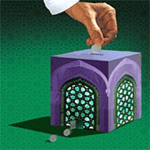BEIRUT (IPS) – ‘The World’ is a manmade archipelago off the coast of Dubai. Developed by the Nakheel real estate company – which partly relied on the issuance of Islamic bonds, or sukuk, to finance the ambitious project – it has come to symbolize for many the vulnerability of the Islamic financial market.

|
|
“The World” islands off the coast of Dubai developed by Nakheel. |
The emirate was luckily bailed out by its richer neighbor, Abu Dhabi, which proffered a 10 billion dollar advance that allowed for the payoff of Dubai’s incumbent debt.
Dubai’s 90 billion dollar debt crisis – both conventional and Islamic – has signaled for many that Islamic finance is no more immune to the global financial crisis than the rest of the world.
“It is nonetheless an oversimplification to say that the Dubai crisis might jeopardize the Islamic financial sector as a whole. This is tantamount to saying that the Latin America financial crisis [which occurred in the 1990s] hindered the conventional banking model,” says Abdel Mawla Shaar from the Ecole Supérieure des Affaires university in Beirut.
Islamic financing has been growing rapidly in many Muslim countries, in the Gulf and some parts of Asia such as Indonesia and Malaysia, with 500 to 750 billion dollars in assets under management.
According to Shaar, the 20 -25 percent growth witnessed by Islamic financing before the crisis, has attracted the attention of many financiers in Western countries, including Britain, France and Luxembourg, lured by the high liquidity levels of Arab regional markets.
“Interest is not allowed under Islamic or shariah law, so Islamic lenders have relied on structures that allow financial institutions to purchase goods for their clients. The institution will then either resell the goods to the buyer in what is called a “murabaha” deal, or in a lease form called “ijarah,” or go into partnership with the buyer in what is known as “musharaka,” explains Badih Khatib, senior manager of treasury, capital markets and correspondent banking at the Arab Finance House.
The sukuk differ from traditional bonds in that they do not offer interest, but rather provide their holders ownership and entitlement to the revenue in the underlying assets.
Khatib believes that one of the problems brought forth by the Dubai sukuk crisis was that many holders mistakenly believed they were guaranteed by the government.
Shaar, however, underscores that the main issue is that Islamic finance investors tend to think in conventional banking terms and are mostly performance driven, while actual Islamic finance is based on the principle of profit and risk sharing.
“Nakheel’s sukuk were secured by existing real estate developments and land that incurred about 50 percent decline, which left investors with largely depreciated securities. Investors can’t expect to mimic the performance of conventional banking tools,” emphasizes Shaar.
Khaled, a young Lebanese working in Saudi Arabia, owns sukuk issued by a Saudi group facing financial difficulties. “I started hearing about the sukuk when I moved to the Gulf and decided to invest in this type of venture, which seemed safer than other conventional products. Now I am not so sure,” he points out.
The potential default of Nakheel’s sukuk raised the issue of how much recourse holders possess against companies that are sometimes owned by the government, and what type of law and jurisprudence are applied. “In the Dubai case, they are governed by British law, it will be interesting to see how the courts of Dubai will view these bonds and whether British or shariah law will take precedence,” says Shaar.
The Nakheel’s sukuk crisis highlighted the fact that Islamic institutions are also vulnerable to the financial crisis. “I really believe that investors, like anywhere else, have to properly do their due diligence by looking at important factors, such as credit and market risks,” underscores Khatib.
One thing remains certain: Islamic institutions were no different than conventional bankers in ignoring the speculative frenzy that took Dubai by storm and incurred massive losses for many sukuk holders.
It also highlights the declaration of one scholar, during a 2008 meeting of the committee of the Bahrain-based Accounting and Auditing Organization for Islamic Financial Institutions, that 80 percent of current sukuk structures are not compliant with shariah laws.
“One Islamic scholar said that if Islamic finance were removed, it would make no difference at all,” concludes Shaar. “Maybe the time has come for Islamic finance to invest in a new and more innovative model.”






Leave a Reply